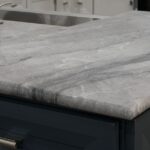After all, which material is more suited when it comes to home countertops? Natural stones such as granite and marble have been a staple choice over the last couple of years, but trends come and go – sometimes for the best. Porcelain countertops are currently sharing the spotlight in interior design with quartz countertops, mostly due to their engineered nature and, of course, visual resemblance. But when faced with the Porcelain vs Quartz Countertops discussion, which one should you choose?
In this article, we’ll find out the answer to this conundrum by analyzing the pros and cons of each material, as well as common applications for both.
Check out as well: The Pros and Cons of Porcelain Countertops
Porcelain vs Quartz Countertops Explained
Before we delve into specifics, everyone needs to be on the same page. Both porcelain and quartz are manmade materials – which means their slabs are not quarried from nature like natural stones are, but rather engineered at warehouses from a combination of chemical compositions and masonry techniques.
At first glance, it’s totally common to mix them up. That’s why we’ve set apart a few characteristics of each material below – so you have a general idea of what to expect when deciding between them.
What Are Porcelain Countertops?
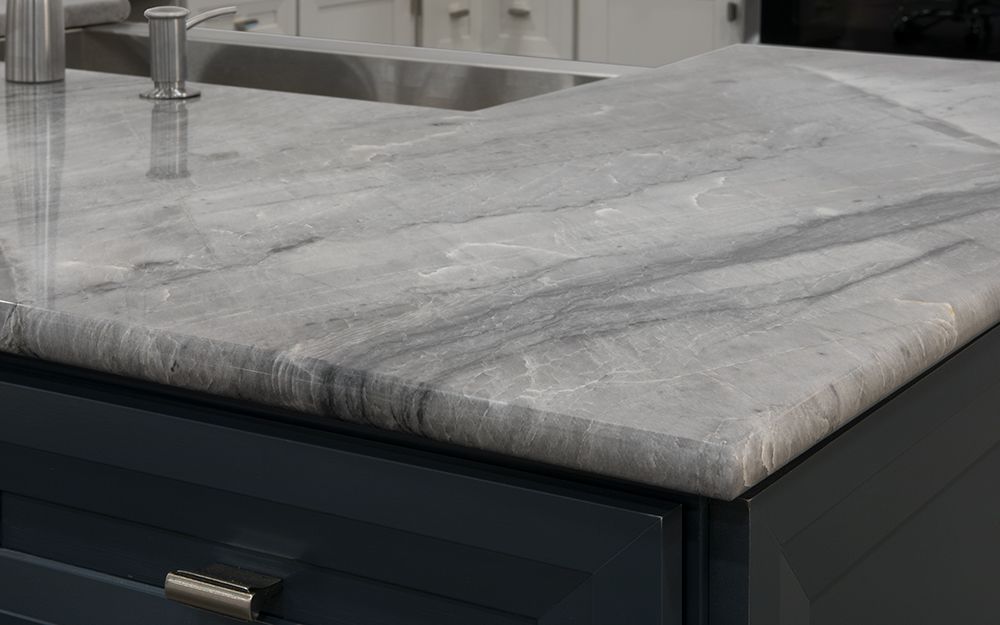
Porcelain countertops are a durable and low-maintenance option for home design, especially for kitchen and bathroom surfaces. Made from porcelain ceramic material (which is formed by heating raw clay with mineral oxides, feldspar, and silica), they are not only resistant to bacteria, scratches, stains, and heat but are also non-porous, making them easy to clean – sealing them is not obligatory. Porcelain countertops come in a variety of colors, patterns, and finishes, offering flexibility in design; they are also environmentally friendly, and thus suitable for both indoor and outdoor use.
What Are Quartz Countertops?
Quartz countertops are engineered stone surfaces made primarily of quartz crystals – found in pure quartzite stones – combined with resins and pigments. They are manufactured through a process that involves grinding natural quartz crystals into a fine powder, mixing them with resins for binding, and then shaping the mixture into slabs. These slabs are then cured under heat and pressure to create durable and non-porous countertops. Overall, quartz countertops are also a popular choice for kitchen and bathroom surfaces, due to their durability, low maintenance, and timeless aesthetic appeal.
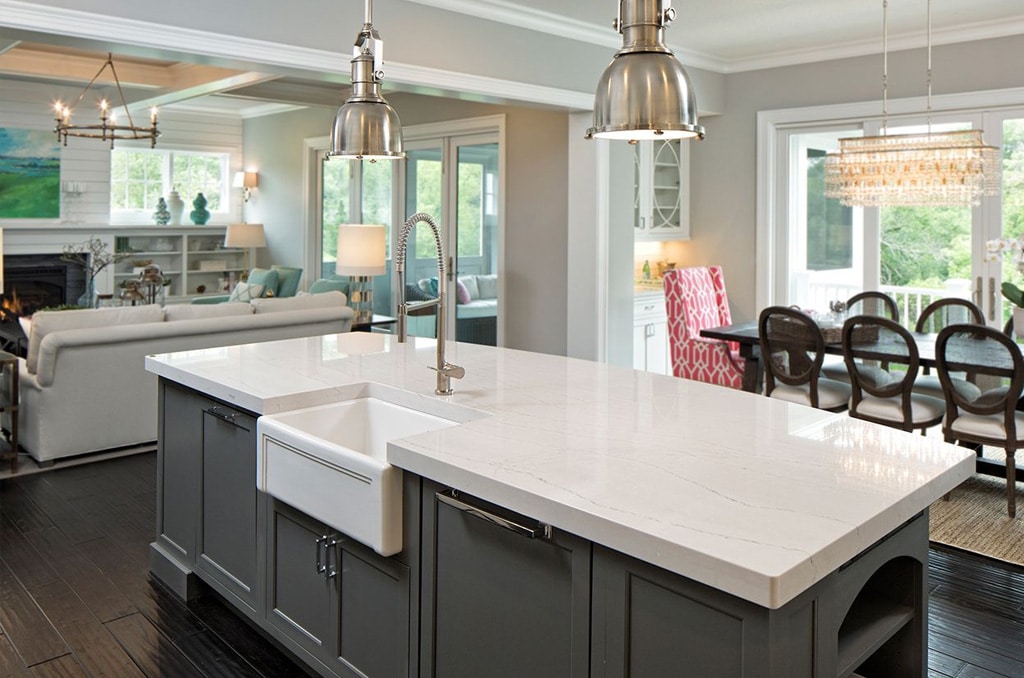
Porcelain vs Quartz Countertops: 9 Factors to Consider
With that being said, the comparison between porcelain and quartz countertops transcends popular consensus in the U.S. Above all, they both offer versatility and aesthetic appeal, with options to suit different design styles and preferences, so the choice between the two often comes down to personal preference, specific design requirements, and budget considerations.
Below, we have 9 main factors to consider when deciding which one is the best for you.
Appearance: It’s a Tie
Porcelain countertops often have a sleek and modern look with consistent color and pattern throughout the slab. They can mimic the appearance of natural stone such as marble or granite, offering a uniform and clean aesthetic and embracing a wide pool of colors at the same time.
On the other hand, quartz countertops offer a wide range of patterns and designs, including options that mimic the look of any natural stone or similar material. Quartz countertops may have varying degrees of veining and patterning, providing a more dynamic and natural texture compared to porcelain.
In terms of appearance alone, the choice comes down to personal preference and the specific design goals of the space.
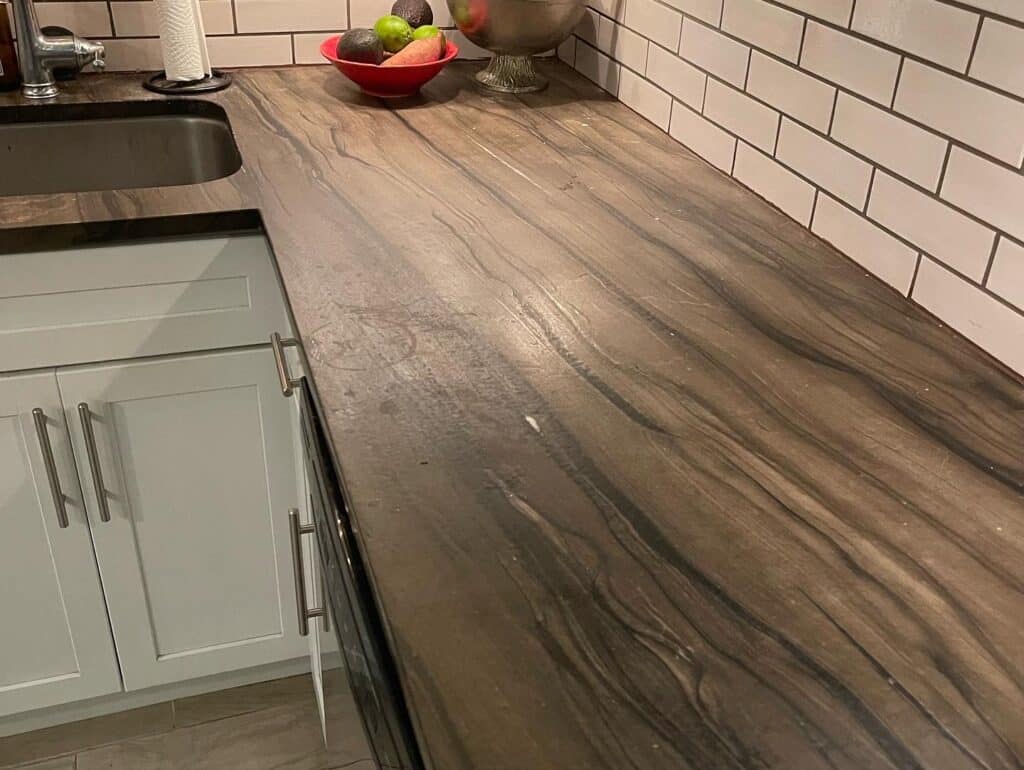
Finishes: Quartz Wins
Porcelain countertops typically have a smooth surface finish – although some designs, like high-gloss glaze or matte, may offer textured finishes to mimic the look of natural stone. Their smooth finish contributes to their sleek and modern appearance.
Quartz countertops also generally have a smooth and polished surface finish – but the versatility is unmatched. Due to the manufacturing process and the inclusion of quartz crystals, quartz countertops have a slightly different feel compared to porcelain, let alone their structure. They typically offer a wider range of finish options compared to porcelain countertops – including honed, polished, and leathered versions.
So while both materials can have smooth and polished surfaces, quartz countertops offer additional finishes and have the upper hand.
Durability: Quartz Wins
Porcelain countertops are highly durable and resistant to scratches, stains, and heat. They are manufactured at high temperatures, which makes them very dense and hard, and also less likely to chip or crack compared to natural stone countertops.
Quartz countertops are also highly durable and resistant to scratches, stains, and heat. They are engineered using a combination of natural quartz crystals and resins, which makes them extremely strong and resilient, on top of being less susceptible to chipping and cracking compared to materials like granite or marble.
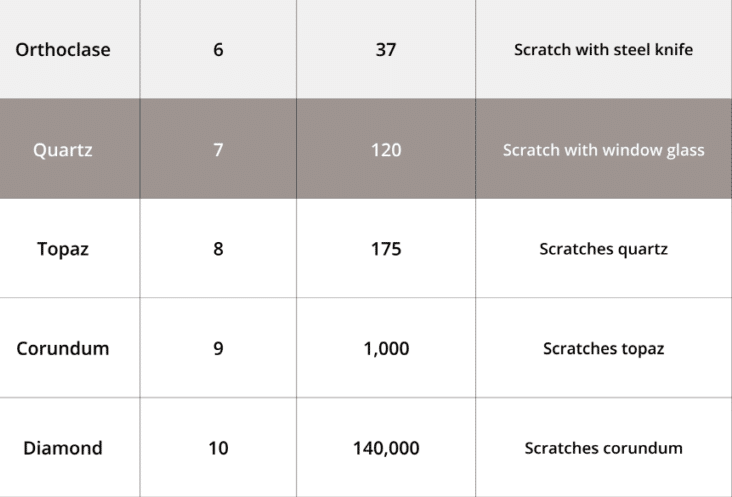
Some people argue that porcelain can be fragile upon first use, but this largely depends on the thickness and quality of the slab, as well as the expertise of the installers. Due to their density, porcelain slabs can be heavy, increasing the risk of breakage if mishandled during installation. However, quartz countertops may still have a slight edge in terms of resistance to chipping and cracking because of their engineered composition.
Heat Resistance: Porcelain Wins
Porcelain countertops are highly heat-resistant and can withstand high temperatures without being damaged or discolored. This makes them suitable for use in kitchens where hot pots, pans, and dishes may come into contact with the countertop surface.
Quartz countertops are also heat-resistant, but they may be less heat-resistant than porcelain. While quartz can withstand moderate heat, prolonged exposure to high temperatures – such as placing hot pots or pans directly on the surface – can potentially cause damage or discoloration to the resin binders used in the quartz material.
Porcelain countertops have a slight edge in terms of withstanding high temperatures without being damaged in the long run. However, it’s still recommended to use trivets or hot pads to protect both surfaces and avoid potential thermal shock.
Scratch Resistance: It’s a Tie
Porcelain countertops are highly scratch-resistant due to their dense and hard composition. However, with due force, they do break – and when they do, they leave behind sharp edges that are costly to restore.
Meanwhile, quartz countertops are also scratch-resistant, but they are not immune to the same problem when enough force is applied. Nonetheless, the scratch-resistant threshold is higher here, so they leave behind less evidence of tear.
In these terms, none comes out the winner.
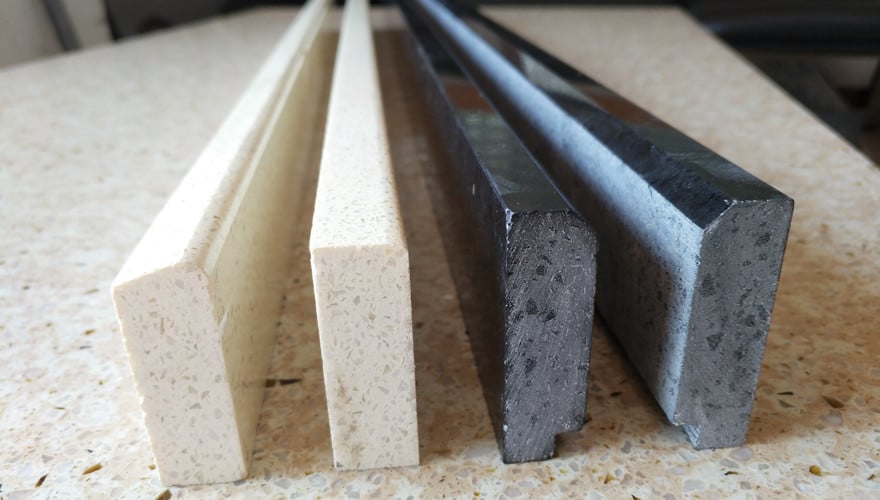
Edge Options: Quartz Wins
Quartz countertops often offer a broader range of edge options compared to porcelain countertops. This is because quartz is a highly customizable material that can be fabricated with intricate details and designs – and while porcelain almost follows the same logic, the material is thinner, limiting the available options. Manufacturers and fabricators of quartz countertops typically offer a wide selection of edge profiles to choose from, including traditional profiles like straight, bullnose, eased, and beveled edges, as well as more elaborate profiles such as ogee, dupont, and waterfall edges.
Quartz, once again, wins here. However, both materials can be customized to suit individual preferences and design aesthetics, and there are still various edge profiles available for porcelain countertops to enhance their appearance and functionality.
Maintenance: It’s a Tie
Both porcelain and quartz countertops are low-maintenance options ideal for kitchens and bathrooms. Porcelain countertops are non-porous, heat-resistant, and scratch-resistant, making them easy to clean with soap and water while requiring minimal upkeep. Quartz countertops are also non-porous and resistant to stains and bacteria, though darker colors may be slightly more prone to scratching due to their resin binders.
Both materials benefit from prompt cleanup of spills with a microfiber cloth and a neutral liquid detergent, as well as the use of cutting boards and trivets to protect their surfaces. The highlight, though, is that none of them must be sealed like porous natural stones do – cutting out budget needs over time.
Installation: Porcelain Wins
Both porcelain and quartz countertops require professional installation due to their heavy and often large slab sizes. However, porcelain countertops can be installed on top of existing countertops without moving the existing countertop surface, which is a huge advantage over quartz countertops.
Given how quartz countertops should only be installed in a cabinetry framework, the whole structure has to “be built around them” to support their weight. Porcelain installation is usually more practical, so it gets the point.
Cost: Porcelain Wins
Finally, the deal breaker. The cost of any countertop can vary depending on factors such as the quality of the material, the complexity of the installation, and any additional customization or edge treatments. That said, you can expect to pay $55- $120 per square foot for porcelain slabs, and $45 to $200 per square foot for quartz slabs.
Remember that the stone color, patterning, and amount of slabs needed all influence the total price. Quartz may work out cheaper if you have a smaller surface area to cover, but porcelain is more cost-beneficial when a complete ambiance renovation is at stake.
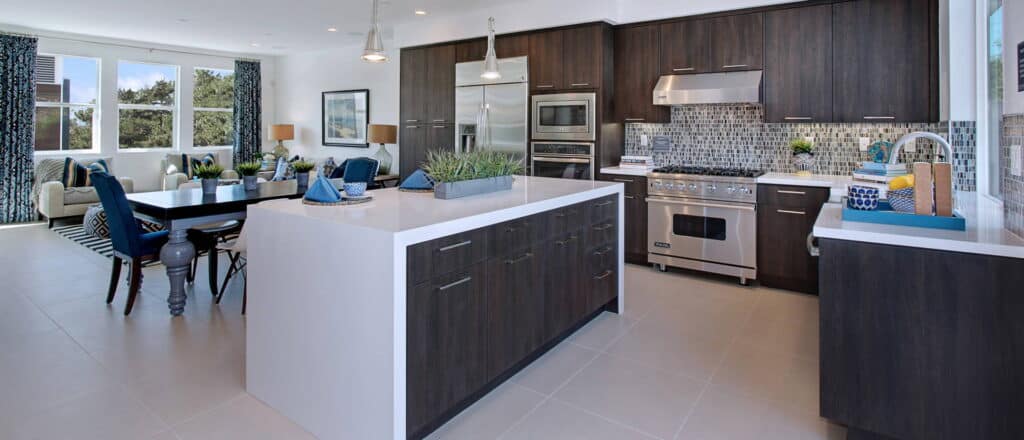
Porcelain vs Quartz Countertops: Conclusion
As you can see, the final score is 3-3, with several ties also thrown in there. When making your choice, considering the factors that are most relevant to you is the way to go about this; just know that both options are equally well-regarded in today’s market, embellishing several homes across the country, and there’s no ultimate truth. It all depends on each case – and if you need help with yours, getting professional assistance is the perfect approach to begin a dream project.
Regardless of material, an average countertop lifespan is between 5 and 10 years. When properly cared for, any countertops can last for generations – even outlasting the household itself and increasing the house’s resale value in the future.
You may also like: Quartzite Countertops vs Granite Countertops
Eagle Stones Has a Vast Catalog of Porcelain and Quartz Slabs Just for You
Eagle Stones has been serving clients all over Sarasota County, Florida, for more than a decade. Our expert agents can go to your home, help you decide the best material for you, give a free estimate, customize the slab the way you want, and install it for you with mastery.

Visit our showroom today – and make sure to get in touch with our team as soon as possible so we can start planning your dream home renovation.

